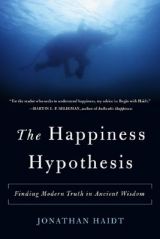


|
The Happiness Hypothesis: Finding Modern Truth in Ancient Wisdom (平装)
by Jonathan Haidt
| Category:
Happiness, Life wisdom, Psychology, Nonfiction |
| Market price: ¥ 168.00
MSL price:
¥ 148.00
[ Shop incentives ]
|
| Stock:
Pre-order item, lead time 3-7 weeks upon payment [ COD term does not apply to pre-order items ] |
MSL rating:
 Good for Gifts Good for Gifts |
MSL Pointer Review:
This amazing book does a great job of dealing fairly with science, religion, politics, and the meaning of life. Highly recommended to all.
|
| If you want us to help you with the right titles you're looking for, or to make reading recommendations based on your needs, please contact our consultants. |

|
| |
AllReviews |
1 Total 1 pages 6 items |
|
|
Publishers Weekly (MSL quote), USA
<2008-04-02 00:00>
Starred Review. The spirit is willing but the flesh is weak, lamented St. Paul, and this engrossing scientific interpretation of traditional lore backs him up with hard data. Citing Plato, Buddha and modern brain science, psychologist Haidt notes the mind is like an "elephant" of automatic desires and impulses atop which conscious intention is an ineffectual "rider." Haidt sifts Eastern and Western religious and philosophical traditions for other nuggets of wisdom to substantiate-and sometimes critique-with the findings of neurology and cognitive psychology. The Buddhist-Stoic injunction to cast off worldly attachments in pursuit of happiness, for example, is backed up by Mihaly Csikszentmihalyi's studies into pleasure. And Nietzsche's contention that what doesn't kill us makes us stronger is considered against research into post-traumatic growth. An exponent of the "positive psychology" movement, Haidt also offers practical advice on finding happiness and meaning. Riches don't matter much, he observes, but close relationships, quiet surroundings and short commutes help a lot, while meditation, cognitive psychotherapy and Prozac are equally valid remedies for constitutional unhappiness. Haidt sometimes seems reductionist, but his is an erudite, fluently written, stimulating reassessment of age-old issues. |
|
|
Booklist (MSL quote), USA
<2008-04-02 00:00>
Using the wisdom culled from the world's greatest civilizations as a foundation, social psychologist Haidt comes to terms with 10 Great Ideas, viewing them through a contemporary filter to learn which of their lessons may still apply to modern lives. He first discusses how the mind works and then examines the Golden Rule ("Reciprocity is the most important tool for getting along with people"). Next, he addresses the issue of happiness itself-where does it come from?-before exploring the conditions that allow growth and development. He also dares to answer the question that haunts most everyone-What is the meaning of life?-by again drawing on ancient ideas and incorporating recent research findings. He concludes with the question of meaning: Why do some find it? Balancing ancient wisdom and modern science, Haidt consults great minds of the past, from Buddha to Lao Tzu and from Plato to Freud, as well as some not-so-greats: even Dr. Phil is mentioned. Fascinating stuff, accessibly expressed. |
|
|
The Times of London (MSL quote), USA
<2008-04-02 00:00>
Riveting...humane, witty and comforting...brilliantly synthesizing ancient cultural insights with modern psychology. |
|
|
Nature (MSL quote), USA
<2008-04-02 00:00>
A delightful book...by some margin the most intellectually substantial book to arise from the 'positive psychology' movement. |
|
|
William Damon, Stanford University, author of The Moral Child, USA
<2008-04-02 00:00>
Every page of this book provides gems of insight about the good life and where to look for it. |
|
|
Bill (MSL quote), USA
<2008-04-02 00:00>
What really makes people happy? How do you live a good life? Do you really have free will?
These questions have haunted philosophy and religion for much of recorded human history. So much so that there are many lifetimes worth of reading available that purport to answer these questions. But what does our expanding knowledge of human psychology and physiology have to tell us about these issues?
Haidt's book will introduce you to the fascinating body of work that is emerging in the social and biological sciences to answer your deepest existential questions. With great clarity and a delightful sense of humor, this book will teach you the surprising and fascinating story of how you work and how to use that information to improve your existence. Everyone could benefit from reading this book, but this is a particularly enjoyable read for those who are interested in psychology and applied philosophy.
Enjoy! |
|
|
|
1 Total 1 pages 6 items |
|
|
|
|
|
|